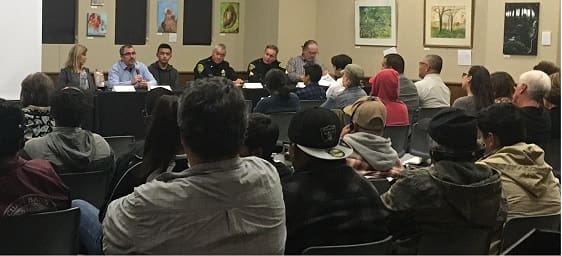
On Nov. 8, 2016, the state of California approved Proposition 64, legalizing the recreational use of marijuana for adults aged 21 years or older, permitting smoking in a private home or at a business licensed for on-site marijuana consumption. California already approved the medical use of marijuana in 1996. Other provisions of Prop 64 include:
- Smoking marijuana is illegal while driving a vehicle, and anywhere smoking tobacco is not permitted, including all public places
- Up to 28.5 grams of marijuana and eight grams of concentrated marijuana are legal to possess under this measure
- Possession on the grounds of a school, day care center or youth center while children are present remains illegal
- An individual is permitted to grow up to six plants within a private home, as long as the area is locked and not visible from a public place
Fighting Back Santa Maria Valley (FBSMV) is more than just a catch phrase; it is also the name of the local coalition which serves a population of about 137,000 people that is 85 percent Hispanic. The Santa Maria Valley is a natural funnel-shaped valley opening west into the Pacific Ocean. It is located halfway between Los Angeles and San Francisco and is fertile wine-producing country. There are several municipalities, including the city of Santa Maria, with a population of 105,093, as well as many unincorporated areas. There are seven middle schools and six high schools within the coalition’s service area.
When FBSMV was first formed in 2003, meth was its primary challenge, but over the years that has changed to a growing problem of alcohol and marijuana misuse, particularly among youth. FBSMV is extremely concerned about the impact Prop 64 will have in Santa Maria Valley, and not surprisingly, it was the centerpiece on the agenda of last Thursday’s coalition meeting. Thirty people attended and included representatives from the school system, the Code-Compliance office (the office that deals with abandoned houses, code violations, etc.), law enforcement, local alcohol and drug prevention, literacy action and legal aid.
“Data already shows that the use of marijuana here is up, and the perception of its harm is down,” explains Edwin Weaver, Executive Director of FBSMV. “So the question we posed at the meeting was, ‘how can we change this belief?’”
“A recent California Healthy Kids Survey that we conducted indicates that approximately 34-45 percent of students surveyed try marijuana as compared to 18 percent to cigarettes,” says Weaver. “With the passage of Prop 64, we know we have a lot of work cut out for us.”
Some of the challenges and ideas discussed were:
- Addressing the problem of accessibility for youth due to abundance of retailers in low-income neighborhoods
- Set up decoy operations
- Create local ordinances limiting the number of retailers per neighborhood, and prohibit them from being located near certain buildings (i.e., schools)
- Addressing the perception that marijuana is not harmful
- Create youth education initiatives
- Implement peer-to-peer coaching
- Increase community awareness/education
- Create and disseminate media ads
Coalition members also discussed strategies for having a unified approach among policymakers and law enforcement as to how local ordinances will be impacted by Prop 64. For example, even though it is permitted by Prop 64 to have six plants per home for personal use, the municipality of Santa Maria had already passed an ordinance banning cultivation and selling marijuana for medical use within the city limits. Coalition members wanted to know if this ordinance would now cover recreational use.
FBSMV has an arsenal of successful educational efforts that will continue to be directed toward marijuana education. For example:
- FBSMV has a close relationship with the schools, the health curriculum was reviewed and time is now allotted to talking about alcohol, marijuana and other drugs.
- Community seminars focusing on marijuana misuse and other issues are part of its suite of services.
- Working with public officials to pass legislation and ordinances limiting access to marijuana in Santa Maria Valley is a practice already in place.
- Working with neighboring counties to prevent dispensaries from going up nearby is also in place.
- FBSMV supports the creation of youth-developed PSAs.
- FBSMV organizes “Safe and Sober” events for teenagers, and these events attract anywhere from 125 to 750 middle and high school students.
- The coalition has also created a mentoring program with a local church.
Because of the large Hispanic population, all of FBSMV’s outreach efforts are bilingual. One of its most successful has been the Parent Project, where free educational classes have been offered in the evenings at the public schools. Youth and their parents are invited to participate in these sessions (adults and young people meet in separate groups but learn the same thing), where professionals provide information and skill-building training to address drugs and alcohol misuse. Attendance is the highest at the classes conducted in Spanish.


